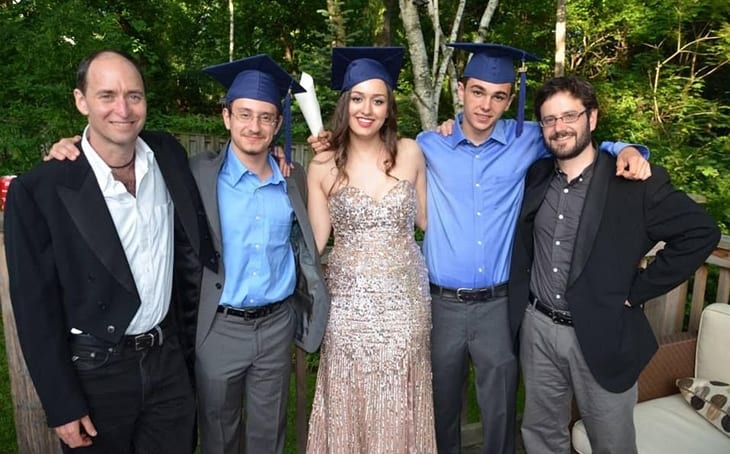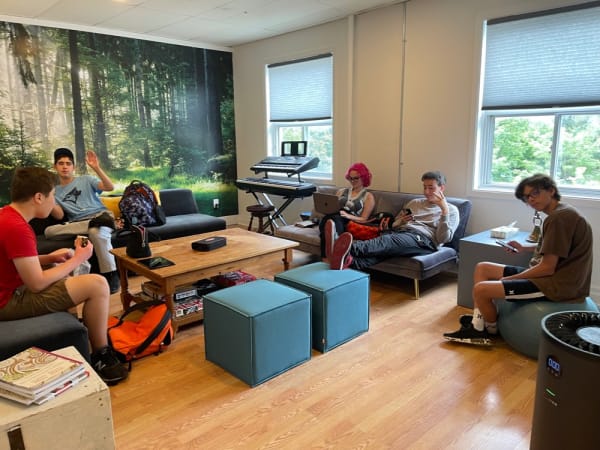
How we see AVRO Academy
Compare with:
How AVRO Academy sees itself
"AVRO Academy is more than a private high school. It’s an empowering community that supports the whole teenager to trust themselves and learn on their own terms. AVRO delivers personalized full & part time programs in engaging ways. We listen and explore individual interests to develop each student’s best learning path. With dynamic IEPs, mentorship and therapeutic counselling, AVRO students build on their strengths and gain the academic confidence they need to succeed in the university or college of their choice."
"SMALLER CLASSES
We offer 5:1 as well as 1:1 attention to every student.
OUR DYNAMIC IEP
Every student is assessed for their support needs to develop their individual Dynamic IEP - a living, evolving guide for success.
RAPPORT-BASED
Teacher and student rapport builds strong relationships, that re-engage learning, curiosity, initiative and confidence.
THERAPEUTIC PROGRAM
Our team provides students and their parents professional on-site support, for both academic and emotional challenges."
"Avro supports student who need more from their high school.
Who is the Avro Student?
Teens who aren't thriving in school due to stress, academic and social anxiety, bullying, and scheduling conflicts.
Teens with a complex IEP, identifying learning difficulties associated with attention disorders, in combination
with significant anxiety/depression, or complications due to family circumstances.
Teens who are diagnosed, as well as undiagnosed, with high-functioning ASD"
"Flexibility
Our admissions are open throughout the year because we know sometimes students need a change of environment that can come at any time. Our team helps onboard new students with assessments of work and progress to date as well as planning and integration into a new class with all the supports needed for success.
."
"AVRO’s Therapeutic Program is unique.
It provides students and parents regular, on-site professional support for both academic and emotional challenges. Our aim is to support the psycho-social needs of our students, in addition to their education.
The program uses a variety of therapeutic modalities, such as Cognitive Behavioural Therapy, mindfulness, as well as music and expressive arts therapy, to enhance creativity and develop a sense of enjoyment in learning."



Science Classroom

Math Classroom



Commons Room

How people from the school’s community see AVRO Academy
Top-down influence on the school’s direction and tone

Efrat Shapir, Principal
MA (Philosophy), MA (History)
AVRO Academy promotes learning that is collaborative, integrated, and nurturing. Our aim is to deliver high school curriculum that inspires hope, promotes connections, and nurtures change. We do this by recognizing that each student learns and shares their learning in different ways. The wonderful AVRO team offers opportunities for our students to connect their learning to their own goals and interests, while at the same time completing Ontario Ministry of Education approved credits. I believe that learning is created by connecting inspiration with information. We welcome your children to join us and explore their inspiration, their goals, and to work through their challenges.
If you’re considering a small school for your extroverted child, make sure it offers plenty of social opportunities, including the ability to seek out and interact with different peer groups. Since smaller schools have smaller and less diverse student populations than big schools, it can sometimes be more challenging for your child to find a like-minded group of friends—friends with similar interests, values, etc.
“It’s important to look at the social makeup of the school,” says Ruth Rumack of Ruth Rumack's Learning Space. "Is there enough variety that your child will have a group that they feel connected with? Because you want to have friends that are like-minded and you want to be in a social situation where you feel honoured and respected. Variety can also be found in extracurriculars, leadership programs, and sports activities, which tend to have kids with a wide range of personalities.”
Also, make sure a school’s teaching and learning approach is suitable for your social child. “For instance, a school focusing on individual learning instead of group learning may not play into your child’s strengths,” say Ann and Karen Wolff, Toronto-based education consultants at Wolff Educational Services. “You want to make sure the social, emotional, and academic realities of the classroom are a match for your child’s personality.”
Smaller schools often have small classrooms and tight-knit communities, which can make it easier for your introverted child to come out of their shell, make friends, and feel like they belong. Since they’re less socially overwhelming, your child should find it easier to navigate their social environment. And since they’re conducive to group work, small classes often have plenty of interaction, which can help your child develop critical interpersonal skills.
Of course, small schools normally have a less diverse student population than big schools, which can sometimes make it more challenging to find a group of like-minded peers—peers with similar personalities, interests, values, etc. This makes it especially important to ask a school about its extracurricular programs, which can help your introverted child establish an intimate social circle.
THE OUR KIDS REPORT: AVRO Academy
Next steps to continue your research:
Continue researching AVRO Academy with OurKids.net, or visit school website.